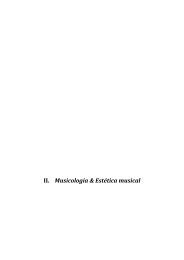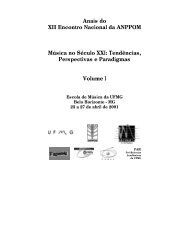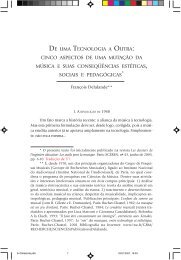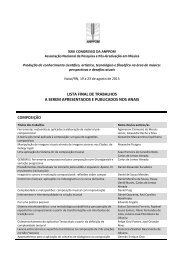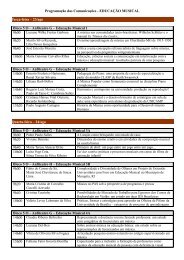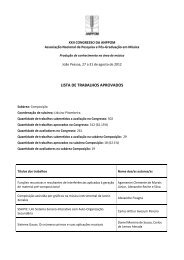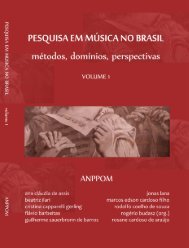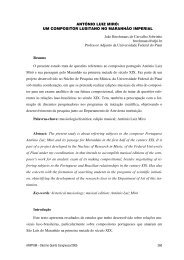download da versão impressa completa em pdf - anppom
download da versão impressa completa em pdf - anppom
download da versão impressa completa em pdf - anppom
You also want an ePaper? Increase the reach of your titles
YUMPU automatically turns print PDFs into web optimized ePapers that Google loves.
You also raised the question about the approach of Pitch-Class Set<br />
Theory. I guess my feeling is the same, which is instead of saying in<br />
advance that it is invalid in some way, because of those numbers or<br />
it’s invalid because the composers didn’t have a concept of the<br />
pitch-class set in some conscious way, instead of judging in advance,<br />
I would say let’s take a look at the analytical results and see what<br />
kinds of things that approach can tell us about the pieces. Then<br />
again in the case of Op.11 n.1 it se<strong>em</strong>s to me that an analitycal<br />
approach based on pitch-class sets is actually pretty rewarding!<br />
Now, it is possible to push it too far, and end up talking about musical<br />
structures that are probably not worth talking about. However it does<br />
appear that in Schoenberg’s Op.11, No.1 the openning three notes<br />
are its basic motivic idea which can be repeated, with the octaves<br />
changed, transposed, reordered, all the things that happen to pitchclass<br />
sets. That turns out to be a pretty rewarding way of thinking<br />
about that piece.<br />
Now, you aluded to the fact that pitch-class set theory has a very<br />
different reception history in North America and in other parts of the<br />
world, particularly in Europe, and that’s absolutely true. Do you<br />
r<strong>em</strong><strong>em</strong>ber, the Dutch theorist named Michiel Schuier when we were<br />
in Guent? He just finished his dissertation and I just got a copy of<br />
that and it’s all about the history of the reception of pitch-class set<br />
theory. Basically he starts out by raising the question: why is this<br />
theory considered so worthless and pointless in Europe and yet<br />
considered so central and basic in North America? And he offers<br />
various reasons for it and very interesting historical reasons why<br />
things have unfolded this way. And there are political reasons,<br />
intellectual reasons, institutional reasons (that have to do with the<br />
University), there are all kinds of reasons why it has unfolded this<br />
way. But he shows, I think very clearly and I certainly agree that this<br />
theory does have something to offer and it is worth paying some<br />
attention to. So, if it is rejected in advance it se<strong>em</strong>s rather foolish to<br />
me. I think another basic insight is that it can be useful to count the<br />
Revista Opus 12 - 2006<br />
173




